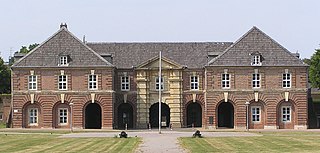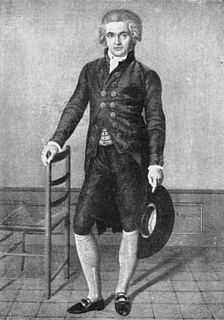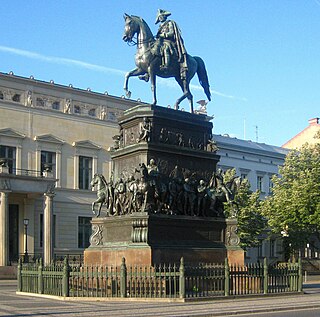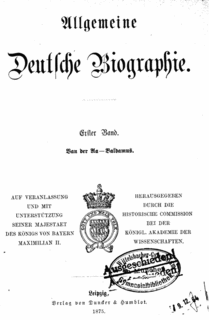
Carl Friedrich Heinrich Graf von Wylich und Lottum, also called Graf Lottum(Count Lottum), was a Prussian infantry general and minister of the State. He is the son of general Friedrich Wilhelm Graf von Wylich und Lottum and his wife.

Generaloberst, in English colonel general, was, in Germany and Austria-Hungary—the German Reichswehr and Wehrmacht, the Austro-Hungarian Common Army, and the East German National People's Army, as well as the respective police services—the second highest general officer rank, ranking above full general but below general field marshal. It was equivalent to Generaladmiral in the Kriegsmarine until 1945, or to Flottenadmiral in the Volksmarine until 1990. The rank was the highest ordinary military rank and the highest military rank awarded in peacetime; the higher rank of general field marshal was only awarded in wartime by the head of state. In general, a Generaloberst had the same privileges as a general field marshal.
The German name Friedrich Wilhelm may refer to:
Friedrich Heinrich may refer to:
Carl Friedrich was a German-American professor and political theorist.

Friedrich Leopold Graf von Gessler (or Geßler; was a Prussian Generalfeldmarschall and one of Frederick the Great's most famous cavalry generals.

Carl Philipp, Graf von Wylich und Lottum was a Prussian Field Marshal.

The Imperial Colonial Office was a governmental agency of the German Empire tasked with managing Germany's overseas territories. Dissolved after World War I, on 20 February 1919 the Imperial Colonial Ministry (Reichskolonialministerium) of the German Weimar Republic replaced the Imperial Colonial Office, dealing with settlements and closing-out of affairs of the occupied and lost colonies.

The Wesel citadel is the largest intact fortification system of the Rhineland and was built 1688–1722 in Wesel according to plans by Johan de Corbin, in the form of a pentagonal star, with each point of the star being a bastion. The citadel was the core of the fortress of Wesel. It is currently used as a cultural centre.

The 1st Foot Guard Regiment was an infantry regiment of the Royal Prussian Army formed in 1806 after Napoleon defeated Prussia in the Battle of Jena–Auerstedt. It was formed by combining all previous Foot Guard Regiments and was, from its inception, the bodyguard-regiment of Kings of Prussia. Save William II, who also wore the uniforms of other regiments, all Prussian Kings and most Princes of Prussia wore the uniform of the 1st Foot Guard Regiment. All Princes of Prussia were commissioned lieutenants in the 1st Foot Guards upon their tenth birthdays. The King of Prussia was also the Colonel-in-chief of the regiment, as well as the Chief of the 1st Battalion and 1st Company of the regiment. Therefore, the regiment held the highest rank within the Prussian Army, which, among other things, meant that the officer corps of the regiment marched before the princes of the German Empire and the diplomatic corps in the traditional New Year's reception. Unofficially, the regiment was known as the "First Regiment of Christendom".

Friedrich (Fritz) Bury was a German artist born in Hanau. He studied first under his father Jean Jacques Bury, who was a goldsmith and professor in the Academy of Design in Hanau, and then with Johann Heinrich Wilhelm Tischbein. In 1780 he visited Düsseldorf, and two years later went to Rome; thence to Dresden, and finally settled in Berlin, where he was patronized by the Queen of Prussia. He painted historical pictures and portraits. A 'Cupid triumphant' by him is in the Hague Gallery.

Philip William, Prince in Prussia was a Prussian Prince, was the first owner of the Prussian secundogeniture of Brandenburg-Schwedt and was governor of Magdeburg from 1692 to 1711.

Friedrich Julius Wilhelm Graf von Bose was a Prussian general who commanded the Prussian XI Corps during the Franco-Prussian War.
Count of Wylich and Lottum may refer to:
Major General Johann Christoph, Graf von Wylich and Lottum was a Prussian officer.
Major General Heinrich Christoph Karl Herrmann, Reichsgraf von Wylich und Lottum was a Prussian officer who fought in the Napoleonic Wars including the Waterloo Campaign in 1815.
Reichsgraf Friedrich Albrecht Karl Herrmann von Wylich und Lottum was a Prussian officer.
Karl Georg Heinrich Bernhard von Poten, known as Bernhard von Poten, was a royal Prussian colonel best known for his military writing.

The Equestrian statue of Frederick the Great is an outdoor sculpture in cast bronze at the east end of Unter den Linden in Berlin, Germany honoring King Frederick II of Prussia. It was designed in 1839 by Christian Daniel Rauch and unveiled in 1851. It was commissioned by Frederick's great nephew, Frederick William III and dedicated by Frederick's great-great nephew, Frederick William IV.












